With Hindi Medium and Angrezi Medium, the "English-medium" actor of independent movies shows she can easily fit into mainstream Hindi movies too.
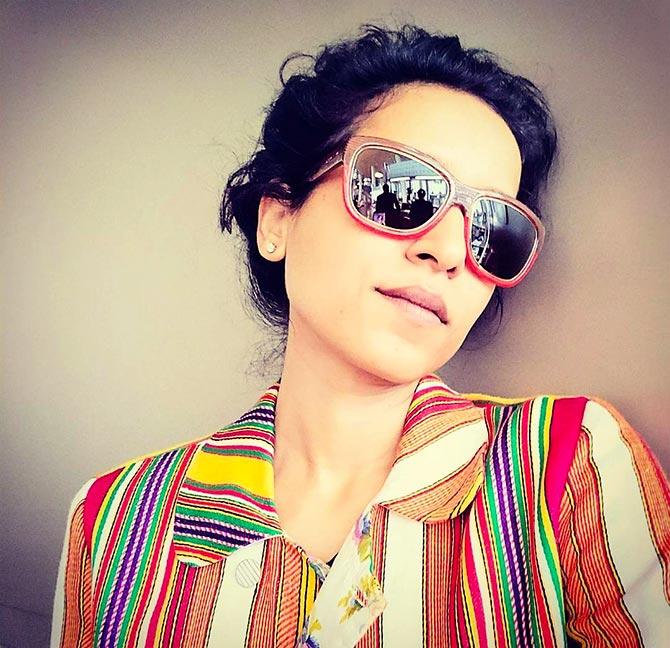
Two significant things happened in Tillotama Shome's first year in college. She watched Piyush Mishra's one-man play, an adaptation of Whatever Happened to Betty Lemon.
The performance drew her to the excitement of the stage, so removed from her own existence as a diffident English literature student with a stammer. "I felt a sense of magic, and a sense of distance -- that I could never do this," she tells Ranjita Ganesan.
The same year, she also encountered a Buddhist idea of the human mind possessing limitless potential, which she was keen on testing before accepting. "So I took on something that I didn't have a natural propensity for."
It led to a shift that Shome describes as "psychosomatic and physical". On stage, she found herself flowing through space and time in ways that even changed her body. "The stammer kind of disappeared." This did not take place overnight, however.
After college, she spent a year with Delhi's Asmita Theatre Group, from which the likes of Shilpa Shukla and Deepak Dobriyal too emerged. "It was a year of failing," she says.
Her finite Hindi vocabulary, "English-medium" education, and the influence her mother tongue Bengali had over pronunciation became a source of merriment for some fellow actors.
At home, the young actor would read aloud Hindi texts for two hours daily, a practice she still follows. The effort paid off when she landed the part of the housekeeper Alice in Mira Nair's Monsoon Wedding (2001).
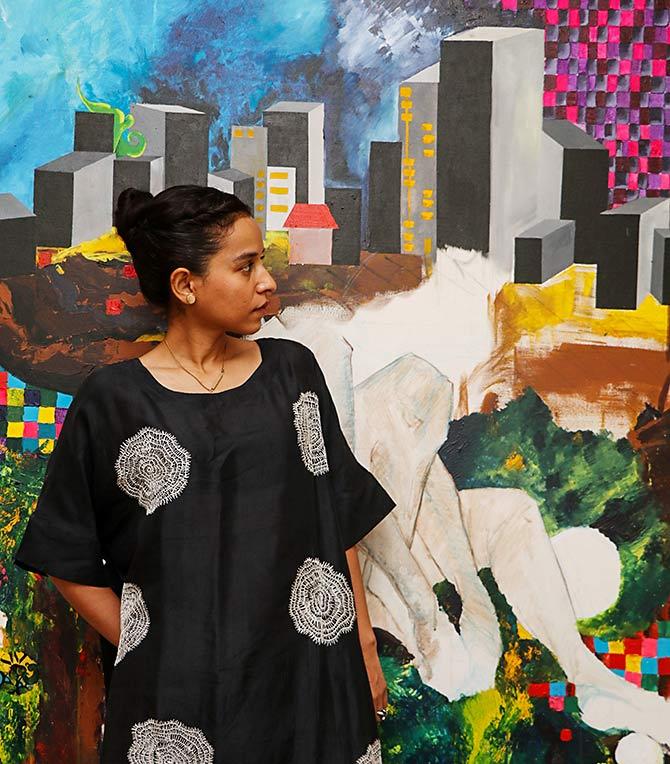
That was twenty years ago. Shome reminisced about these incidents over the phone, just after the India release of her most recent film Sir-- already among the highest-grossing Indian films in France -- was postponed as the country locked down.
She excused herself from the conversation for a few minutes because residents in the Yari Road building where she lives in north west Mumbai were discussing how they would deal with the lockdown.
It was decided that each family would take turns cooking meals for the staff and cleaning the common areas.
Such a sense of community is familiar to the actor from her years growing up in colonies of the armed forces where, if a child was hurt, they would wash up at whichever home was nearest.
Shome's father was in the Indian Air Force and they shifted cities with every new posting, living for a time in Kolkata, Barrackpore, Bengaluru and a less-troubled Kashmir in the 1980s.
Films had not been a big part of that milieu. There were some hours of Doordarshan every week -- the Japanese drama Oshin, a docuseries on the gymnast Nadia Comaneci's life, Pierce Brosnan in and as the special detective Remington Steele.
A Sunday tradition of going out for movies and ice cream only started when she and her brother were a little older. She was more bookworm than aspiring thespian.
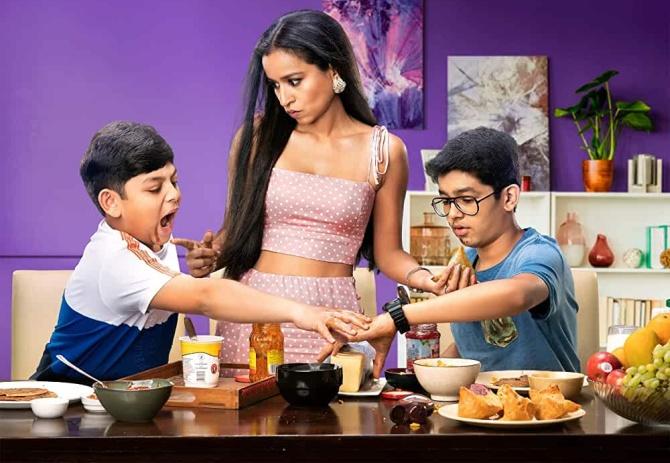
So in several ways, drama became "an act of defiance". Its transformative effects convinced her to leave for New York University where she studied drama therapy on a scholarship, an academic break many would have hesitated to take right after their first film.
But her course was headed by Chris Vine whose classes she would have signed up for "even if he was teaching under a banyan tree".
While the stint in Delhi theatre had prepared her for acting, all her classmates possessed that skill plus an understanding of ballet, burlesque and numerous musical instruments.
Shome made up for what she lacked in training with hard work and osmosis. "Every day I felt like I failed," she recalls. "But when I came out of it I realised how much I had absorbed like a sponge."
When she returned to India a decade later, her auditions for films were more seasoned.
By then, she had learnt things like employing songs to adjust to particular scenes and topographies.
She had also learnt while teaching educational drama with Chris Vine's team in the prisons, shelter homes and "metal-detector schools" in distressed neighbourhoods of the United States.
Shome knew cinema was her medium when she faced Declan Quinn's camera under Mira Nair's gaze for Monsoon Wedding.
The privacy which its invisible fourth wall allowed appealed far more than the adrenaline rush of performing live.
The most demanding role was in 2013's Qissa: The Tale of a Lonely Ghost, Anup Singh's sinister Punjabi period drama about a patriarch so desperate for a male heir he forcibly raises his fourth daughter as a son.
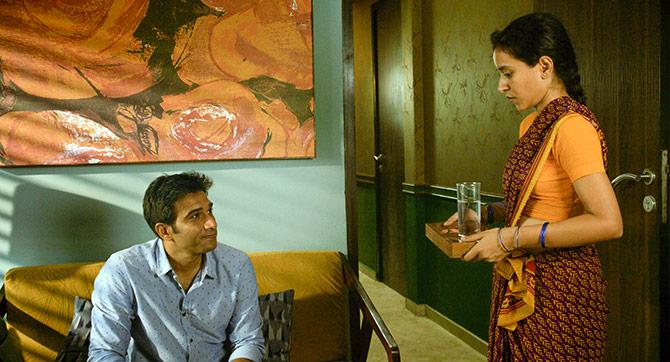
A few moments in that work are indelible. Shome, playing Kanwar, the young girl-boy, watches in grief-stricken anger as her father, played by Irrfan Khan, tries to force himself on Kanwar's new bride.
Kanwar then brings out a gun and shoots him. "I panicked because I could not find the right emotion. What makes someone rape? What do you feel if your own father does that?" She prepared for the scene, on Singh's cryptic instructions, by focusing on a leaf on a nearby banyan tree.
"When the leaf fell from the tree, that became an emblem of my relationship with my father. It cut away from the source physically, which was a liberation but also a death sentence."
Much of Shome's work remains under-watched. There were periods of unemployment and unsuccessful auditions with bigger, more conventional production houses.
This bothered her until Irrfan, with whom she has shared the screen frequently, snapped her out of it with a remark: "Don't be such a Meena Kumari (code for 'tragedy queen')."
She determined then to not be resentful and to fill her day instead with other things -- reading 300 pages in one sitting, swimming for an hour, picking out ingredients, cooking one meal daily.
So when the offers trickled in again, she was able to evaluate them by asking: "Would working in this film be better than the day I am having?"
This approach has made her part of several ambitious, layered films, which often cast Shome as someone from deprived sections of society.
Shome is utterly self-aware. She prefaces any discussion about films where she has portrayed the disenfranchised with a reference to her own position of relative privilege.
The most recent was her turn in Sir as Ratna, a domestic worker whose employer falls in love with her.
Rohena Gera directs the film with a delicate nuance that has so far been tellingly absent in such themes.
When the actor went on the Internet to look up relationships between maids and bosses, the hits were all for pornography.
She felt comfortable accepting the role when Gera explained Ratna's "innate dignity which she never loses no matter how undignifying the situation".
In the last few years, Shome has essayed more diverse parts. She played the languid Anglo-Indian Bonnie in Konkona Sen Sharma's painstaking debut Death in the Gunj (2016).
In the commercial comedy Hindi Medium (2017), she became a snooty education consultant who effortlessly breaks into German. The producers invited her to be part of the recent sequel Angrezi Medium (2020).
With those two films, in another act of defiance, the "English-medium" actor of independent movies showed that she could fit into Hindi-language films in the mainstream too.










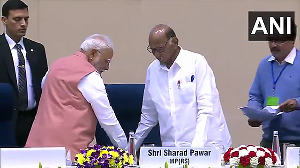

 © 2025
© 2025